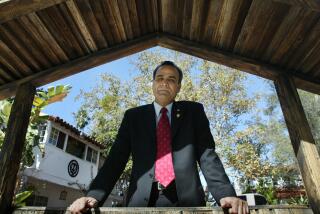Former Gemstar CEO Pleads Guilty in Criminal Case
- Share via
Former Gemstar-TV Guide International Inc. co-founder and Chief Executive Henry Yuen pleaded guilty Tuesday to criminal charges of destroying subpoenaed documents during a probe into accounting irregularities at the company.
Yuen’s plea agreement with federal prosecutors calls for him to serve six months of home detention, donate $1 million to charities for low-income victims of fraud and pay a $250,000 fine. U.S. District Judge John Walter didn’t rule on the plea deal and scheduled sentencing for Dec. 19. Gemstar opposed it.
“Gemstar was not consulted with respect to the plea agreement and does not endorse that agreement,” the company said in a statement filed in federal court in Los Angeles. “Through his scheme to mislead stock analysts and investors by overstating Gemstar’s reported financial performance, Mr. Yuen was able to enrich himself with hundreds of millions of dollars in stock sale proceeds and compensation.”
Gemstar, the biggest maker of software to run cable-television program guides, paid $70 million to settle shareholder lawsuits and $10 million to the Securities and Exchange Commission because of Yuen’s misconduct, the Los Angeles-based company said. Yuen admitted destroying e-mails and other documents that the SEC subpoenaed in 2002.
Judge Walter didn’t want to impose a sentence Tuesday, as both U.S. prosecutors and Yuen’s defense had asked, because he said he didn’t have sufficient information about the case and its background to make a meaningful decision. If Walter rejects the agreement, the case may go to trial, with Yuen facing as many as five years in prison.
Michelle Rice, a lawyer for Yuen; Richard Stone, a lawyer for Gemstar; and Assistant U.S. Atty. Jackie Chooljian declined to comment after the hearing.
Yuen and Gemstar’s former chief financial officer, Elsie Leung, are scheduled to go on trial in December on civil charges that they reported false advertising sales and inflated revenue by about $248 million from 1999 to 2002. A previous agreement to settle that case fell apart earlier this year.
More to Read
Inside the business of entertainment
The Wide Shot brings you news, analysis and insights on everything from streaming wars to production — and what it all means for the future.
You may occasionally receive promotional content from the Los Angeles Times.










